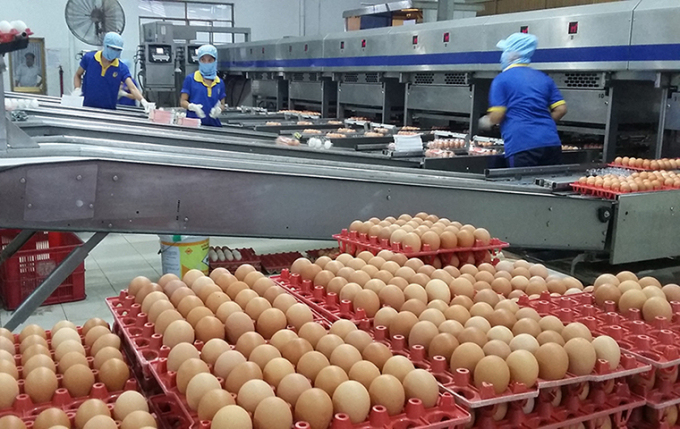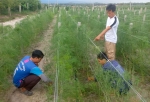Vietnam's poultry egg production in the period 2015 - 2020 will grow at an average of 12.67% per year, 4 times higher than the global average growth in the same period.
On October 9, the Vietnam Poultry Breeding Association held a webinar "Production and trade of poultry eggs in Vietnam and around the world, market prospects".
The seminar was organized in an online form with the participation of representatives of the Department of Livestock Production, Department of Processing and Market Development of Agricultural Products (MARD), members of the Vietnam Poultry Breeding Association and some enterprises producing and trading eggs in Vietnam...

Mr. Nguyen Thanh Son, Chairman of the Vietnam Poultry Association chaired the conference via online form. Photo: Trung Quan.
Vietnam egg production increased sharply
Mr. Nguyen Thanh Son, Chairman of the Vietnam Poultry Breeding Association said: The workshop was organized to contribute to promoting the production and consumption of eggs in Vietnam and in response to the 25th anniversary of "World Egg Day". . On that basis, the Vietnam Poultry Breeding Association will organize many activities to honor and promote the egg production industry in Vietnam.
According to experts' forecasts, the global egg market is expected to grow from more than 213 billion USD (in 2020) to more than 227 billion USD (in 2021). On average, in the period 2012 - 2020, world egg production grew by 2.9% annually.
In 2020, the global export of chicken eggs will reach about 2 million tons in volume and 3.5 billion USD in value. In which, major exporting countries such as the Netherlands (409,000 tons), Turkey (281,000 tons), Poland (196,000 tons), the US (145,000 tons), Germany (109,000 tons) ... accounted for 78% of the total output. export.
It is forecast that by 2025, the global egg market will reach more than 297 billion USD, with a compound annual growth rate (CAGR) of 6.7%. By 2030, the global chicken egg market continues to expand and is forecast to reach 138 million tons.
The population in developing countries will increase to 6.9 billion by 2030 and account for 85% of the global population by 2050. Thus, in these countries, the demand for poultry meat and eggs in will continue to increase in the future.
In Vietnam, in recent years, the poultry industry has achieved a high growth rate. The annual production of eggs is constantly increasing, from more than 8.8 billion eggs in 2015 to more than 16 billion eggs in 2020. The average growth in egg production of Vietnam in the period 2015 - 2020 will reach 12 0.67%/year, 4 times higher than the global average growth in the same period.
However, egg consumption in Vietnam currently reaches 149 eggs/person/year (by 2020). Meanwhile, the world's average egg consumption is about 210-220 eggs/person/year. Some countries consume more than 300 eggs/person/year such as Mexico, China, Japan, Spain, Malaysia, Indonesia...
With a population that will increase to over 100 million people, the potential of Vietnam's egg consumption market is still very large.
However, in the past time, due to unstable prices, the competitive pressure of commercial egg products has become very fierce, forcing some businesses and farms to reduce capacity or suspend investment expansion.
Consumption plummeted due to Covid-19 epidemic
Ms. Tran Ngoc Yen, Director of AgroMonitor Industry Analysis Division, said: For the foreign market, currently the major egg producing countries that are emerging are China, the US, the EU region, and India.
These are countries that have a developed food industry and are densely populated. However, in the context of the global impact of the Covid-19 epidemic, these countries are also facing a lot of difficulties in production.
For the domestic market, our current egg distribution channel is 50% to households for daily meals and 50% to collective kitchens. However, due to the impact of the Covid-19 epidemic, many factories, schools, restaurants, collective kitchens ... had to close or operate in moderation. Combined with people's lack of awareness about the real role of eggs in daily life, the market's consumption has decreased significantly.

According to the assessment, Vietnam's egg industry has great potential and room for development in the future. Photo: TL.
In addition, some industries that use eggs as raw materials, such as confectionery production, have also been suspended. In particular, the biggest difficulty for the poultry industry is the continuously increasing price of animal feed.
Therefore, although Vietnam has advantages in terms of production conditions such as weather, climate, people's long-standing livestock tradition, the acumen of businesses in applying processes and technologies. However, in the current context, it is not too expected in the last months of 2021 but until the beginning of 2022, when the level of Covid-19 vaccine coverage is higher, the accurate assessment of the market will be possible. guaranteed.
At the conference, representatives of egg production and trading enterprises also expressed their views on the development orientation of the egg industry in the future. At the same time, suggest solutions for the Vietnam Poultry Breeding Association to make recommendations to ministries and sectors in the coming time to help Vietnam's egg industry in particular and poultry farming in general develop more and more.
In which, the delegates all agreed that the development potential of Vietnam's egg industry is very open, there is much room for development, not only solving nutrition problems but also creating jobs for millions of farmers. country.
In the coming time, the delegates proposed to the Ministry of Agriculture and Rural Development to have a clear orientation for Vietnam's egg industry in the direction of production not only meeting domestic demand but also towards export.
At the same time, supporting and promoting propaganda and communication activities about the egg industry, building programs to stimulate demand for egg consumption such as the program to put eggs in schools, hospitals, nursing homes, etc. expand the egg consumption market, and gradually change people's habits and awareness about eggs. From there, helping the egg industry have a basis for sustainable development in the future.


















